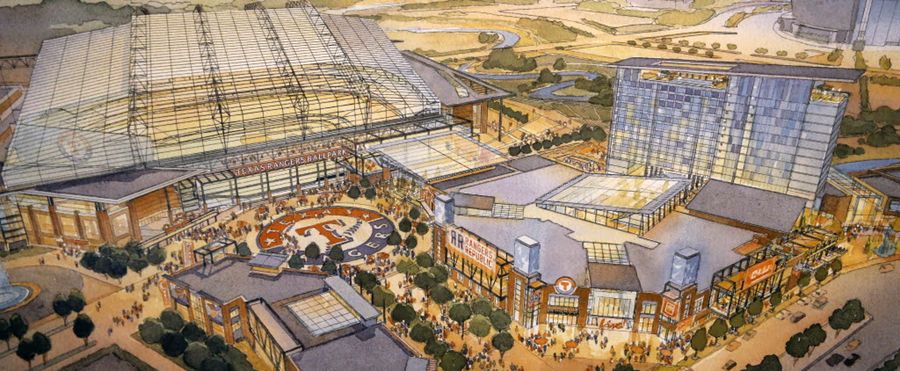A recent report on the proposed Texas Rangers’ retractable-roof ballpark stated that the final cost for taxpayers could be near $1.7 billion, but some experts dispute that finding.
Most estimates have put the funding of the $1 billion ballpark at a 50/50 split between the Rangers and the City of Arlington. There are some costs that will come on tap of that, however, such as an estimated $400 million in interest on the bonds Arlington uses for the project and a pair of fees on gameday attendees–a 10% ticket tax and a $3 parking tax— that will be used by the Rangers to cover their share.
However, WFAA recently crunched the numbers with further scrutiny, and came to the conclusion that Arlington is not taking into account “lost revenue streams,” such as naming rights and seats licenses, which will be captured by the Rangers. More from WFAA:
Monday afternoon, hours before this story aired, the pro-stadium group “Vote Yes!” sent WFAA-TV a cost estimate, claiming Arlington residents would end up paying only $330 million over 20 years.
Unlike the WFAA-TV estimate, the political group’s estimate did not include the cost of giving naming rights to the Rangers, and the city’s possible loss of seat licenses – amounting to about $300 million that could be used to pay off public debt.
While the “Vote Yes!” estimate acknowledges Arlington will need to pay interest on the $500 million bond, it projects bond interest costs at $165 million over 20 years, rather than the more conservative $500 million interest fees over 30 years – an estimate provided by the city.
The naming rights agreement essentially allows the Rangers to keep 100% of the revenue, but $2 million per year from that source will be diverted to pay the team’s rent. While the split of naming rights revenue is not uniform across major sports, it is rare for a government to capture 100% of a naming rights. Furthermore, money from seat licenses tend to go to teams.
Taking into account those issues, some experts, including David Carter, the executive director of the Sports Business Institute at University of Southern California, question the $1.67 billion figure. More from Dallasnews.com:
St. Louis used seat licenses to build a dome and then lured an NFL team, which has now moved to Los Angeles. But typically, the licenses are used by the teams, not government.
Carter said stadium deals typically favor the teams, which often have leverage and greater sports business expertise. He couldn’t recall any deals that would be as lopsided as the one assumed by WFAA’s math.
“It would be highly unusual for a municipal government to capture, in total, all those types of revenues,” he said. “They [cities] might be able to recover a portion of a ticket tax or parking tax or some other fee. But to get 100 percent of some of those large buckets, I don’t think that is practical.”
The ballpark proposal is up for a referendum on Election Day. Recent polling from WFAA and the Star-Telegram indicates a close race, with the for and against margins both equaling 42%.
RELATED STORIES: Poll: Voters Split on Rangers Ballpark Plan; If Referendum Fails, is Dallas an Option for Rangers?; Texas Live! Construction to Begin in November; Rangers Confirm Plans to Repurpose Globe Life Park; Rangers and Dallas Confirm Past Ballpark Talks; Proposed Rangers Ballpark Could Reshape Payroll; Globe Life Park Redevelopment Could Include Condos, Ampitheatre; Rangers: Adding Shaded Seating to Globe Life Park Just Wasn’t Feasible; Rangers Ballpark Measure on Fall Ballot; Rangers Ballpark Proposal Takes First Step Toward Ballot;Ballpark Proponents, Opponents Go to Work; Funding Details Emerge for New Rangers Ballpark;Council Unanimously Approves New Rangers Ballpark; Vote Up Next; New Rangers Ballpark: A Billion Dollars, 2021 Opening; New Retractable-Roof Ballpark on Tap for Texas Rangers;Construction delayed on Texas Live!; Will Entertainment Development Lead to New Rangers Ballpark?; Mixed-use development pitched for Globe Life Park

